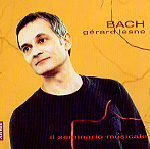The question here does not concern countertenor Gérard Lesne’s credentials as one of today’s premier singers; rather, it’s the repertoire, as this recording is built on some obscure solo arias and cantatas by two of the more obscure composer-members of the Bach family. There’s Johann Christoph, a first cousin of Johann Sebastian’s father, and Johann Michael, younger brother of Johann Christoph–both of whom were born in the 1640s and who died well before Sebastian’s artistic maturity. J.S. is represented, too, and the differences between his music and that of his older relatives is striking.
Another striking feature of this intriguing program is the blend, balance, and overall texture of the instrumental accompaniments relative to the voice. The ensemble, which is rich in middle and lower-register instruments–violas, viols da gamba, cello, and violone–and the relatively thick, heavily ornamented scoring tends to overwhelm Lesne, even though his lyric vocal quality is carefully focused and carries well.
Johann Christoph Bach’s lament “Ach, daß ich Wassers gnug hätte” is tedious, dramatic–that is, lots of starting, stopping, slowing down, speeding up, weighty accents–and at nearly nine minutes, a test of listener endurance (which Lesne rewards with an exquisitely shaped final two notes). We certainly feel the intended mood, but it’s a rather unsatisfying, unsettling place for a listener to be abandoned. (You’ll have to decide whether you agree with the liner-note writer that this is “a pure masterpiece”.) But as soon as the true master J.S. takes over–in the third track, with the aria “Widerstehe doch der Sünde” (from Cantata 54, which is performed in its entirety), the sun shines, the melody flows in a beauteous stream (even though its subject, the resistance of sin’s temptation, is not exactly lighthearted fare).
The rest of the program varies from quite lovely vocal writing–Johann Michael’s “Ach wie sehnlich wart’ ich der Zeit”–to another Johann Christoph marathon-length lament, “Wie bist du denn, O Gott”, which turns out to have some solidly satisfying moments, notably its assertive violin solo. Throughout, Lesne exhibits the highest standard of vocal technique, enhanced by artful phrasing and occasionally over-stressed dramatic effects. So, this is a mixed bag of both well-crafted and cumbersome arias, all well-performed if a bit heavily weighted, and delivered in a kind of strangely crude, unbalanced sound that favors instruments over the voice.
































